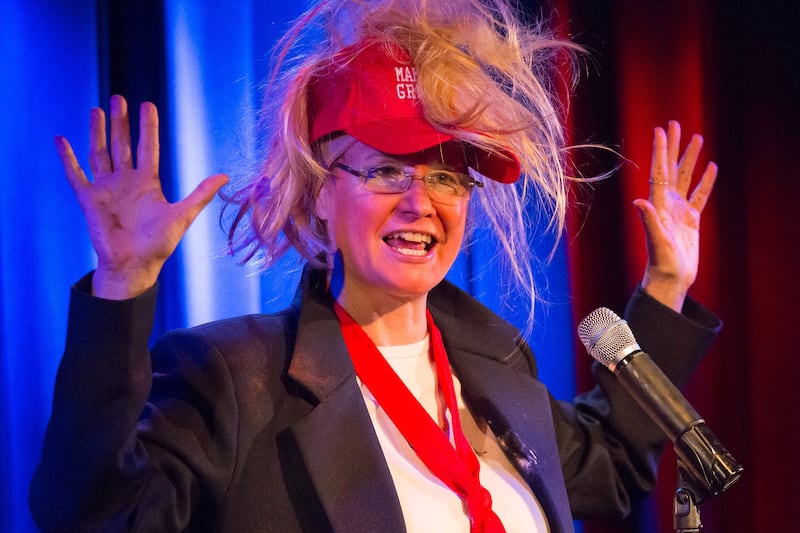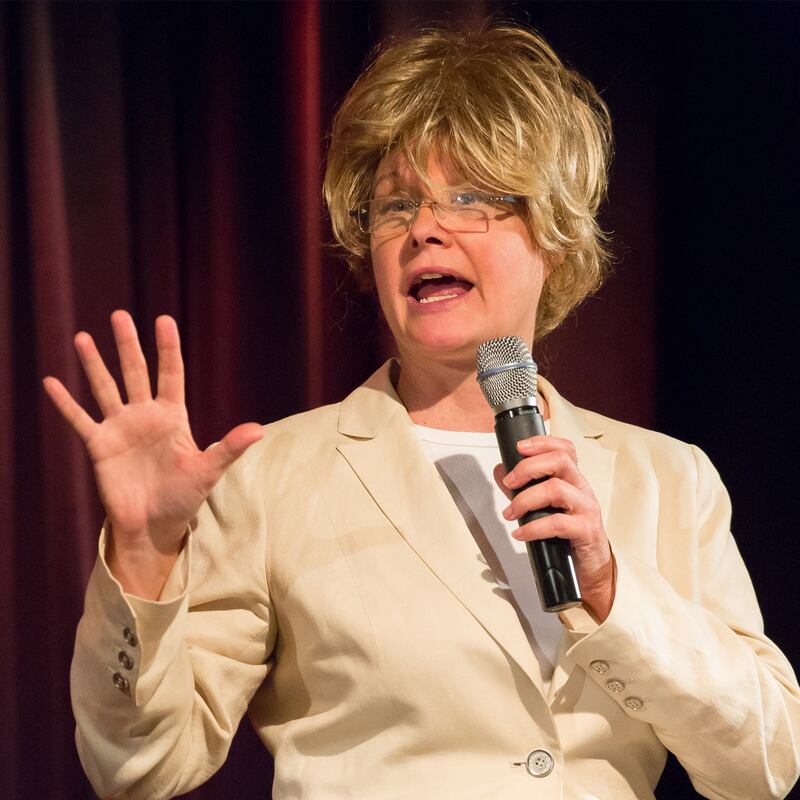Karen Finley materialized amongst the audience at the Laurie Beechman Theatre on New York’s 42nd Street, a phosphorescent eruption of white fur and silvery sleeves, then moved stage-wards, unleashing a stream of commentary punctuated by smiles of unnerving brilliance, her chin thrust forwards.
This evening is billed as Unicorn Gratitude Mystery and Finley is clearly the Unicorn. She got to the stage, swung around and the sharp-edged one-liners began.
Rewind time. I first saw Finley’s work at the Pyramid on Avenue A in the East Village in the ’80s.
ADVERTISEMENT
She would deliver herself of searing social and personal commentary, sometimes naked and always with an involving orchestration of shrieks, groans and whoops.
I missed performances during which she applied yams and coated herself with chocolate, actions which have entered the lore of transgressive art, but what was at once terrific and paradoxical about the pieces I did see was that she was communicating abjection with unerring command of her space.
Finley was born in Chicago in 1956 to an Irish-American family which included the unflinching humorist, Finley Peter Dunne, known for such observations as “Comfort the afflicted and afflict the comfortable,” who in a period when the powers-that-be had thicker skins was much admired by his frequent target, President Theodore Roosevelt.
Finley went to college in Chicago, them on to the San Francisco Art Institute, where she became involved with Bay Area Punk, performing in gallery spaces and burlesque houses.
It was there she met Brian Routh, a Brit with the raw performance duo, the Kipper Kids. They were married in 1981.

Finley launched into performance and art-making in New York after graduation and put bread on the table by working in clubs.
“I was a bar tender at Danceteria,” she says. “I worked at Area too. I used to do the liquor inventory on Mondays. I co-curated Obsession Night one summer. The club culture was fierce. And it was radical. I think having fun is a radical gesture. I’m interested in spaces which are against being obedient. The obedient culture. I guess that’s why I like performing in a club. It’s my preferred space.”
By the time I saw Finley she was very much part of the culturescape, not just in New York, but far-flung—a British performance was shut down in 1986—and not just in clubs but in such spaces as Lincoln Center.
Her work was, and is, raw to the point of scariness, accessing such dark materials as her father’s suicide, incest, and the violation of children. But what Finley’s pieces are not, of course, is erotic.
Nonetheless in 1990 details of her oeuvre found their way to Rowland Evans and Robert Novak, the conservative co-authors of a powerful syndicated column and a force on TV.
They also learned that Finley’s work was sometimes subsidized by such publicly funded organizations as a particular hate-object of the right, the National Endowment for the Arts.
Oh, joy!

“The chocolate-smeared woman” duly starred in a column. She and three other Performance artists, John Fleck, Holly Hughes, and Tim Miller, whose work also dealt forcibly with sexual politics, were de-funded. They sued. “Finley Versus the NEA,” Finley says. “We filed in the Ninth Circuit of Los Angeles and we won.”
The Clinton administration took the case to the Supreme Court, which ruled against them four painful and painfully expensive years later.
Finley took off for Los Angeles, devastated. “I was thinking I needed a geographical change,” she told me soon after her return. “And I felt a bitterness towards the art world.”
She was attacked for being sexual so she posed for Playboy on chocolate-colored sheets. But she returned to New York in 2000. “I realized that I am not Hollywood. I’m an artist and a cultural provocateur. I just felt that I needed to be in the art world.”
Some woman artists had been important to her when she began, like Carolee Schneemann, whose Meat Joy had been crucial in the ’60s. “If it wasn’t for what she did I wouldn’t be doing what I did,” she says. Likewise Yoko Ono, Charlotte Moorman, Whoopi Goldberg, and Judy Chicago, whose piece, The Dinner Party, a triangular table with vulva-like place settings had been a pioneering piece in the ’70s.
But now, post NEA, support came from artists when she needed it most. Hannah Wilke reached out, “Before her early untimely death, she took time to talk to me,” Finley says. “And Louise Bourgeois was wonderful to me during the Culture War. I spent some time with her and wrote a spoken word piece that she asked me to perform.”
Finley’s mix-media career has been flourishing ever since, as in Pooh Unplugged, her re-done and re-drawn Winnie the Pooh for grown-up nurseries only (Enemas are a plot point, kiddies); and George and Martha, which evokes the mythic affair between George Bush and Martha Stewart set in an unlovely motel room.
Her most recent exercise in icon-shattering was The Jackie Look, in which she conducted the audience in a breathy-voiced, sharply-etched monologue as the embodiment of Jackie O.
Now Unicorn Gratitude Mystery gives us Karen Finley’s readings on the electoral jamboree (with, I note, assistance in the costume department by Violet Overn, her 22-year-old daughter by her second husband, Michael, who she married in 1988).
”I wanted to create a work about the politics of the time,” Finley says. “But I wanted it to have more depth than something you could see on Saturday Night Live. And to go into a more psychological or psycho-sexual portrayal of our times. And the characters and archetypes that we’re dealing with.”
Why a unicorn?
“I have always been interested in unicorns. I collect unicorns. I was just interested in the mythology of what it represents.” And, she notes, one thing the word Unicorn represents is a billion dollar company in Silicon Valley.
Onstage Finley’s Unicorn riff is succeeded by a stretch during which she flashes unnervingly bright grins and stresses her unrelenting gratitude that we were there, listening to her.
“I was thinking about the politeness of polite society,” Finley said. “And the aggressiveness and the hostility within those spaces. There’s a passive-aggressiveness with manners, with the way we present ourselves.”
And she doesn’t just stick it to conventional targets. “The Unicorn Piece, I think in a way it can almost be looked at as Bernie Sanders, though I don’t mention him. Next time I do it it’s going to be about the unicorn returns to Vermont.”
Where the performance takes us next seems an organic evolution from The Jackie Look. Finley’s hair seems somehow to assume a familiar shape and she is pant-suited.
Yes, this is her ‘Hillary,’ and she launches into a surreal riff, punctuated from time to time by the haunted question: “Who is wearing the blue dress now?”
At the climax—she is wearing black not blue—she clutches something to her chest, melting ice cream one would guess, because suddenly splurges of creamy goo are crawling down her frontage.
The audience convulses.
Then Finley segues into the usual suspect.
“I’ve been interested in Trump since he was so horrible to Rosie O’Donnell. I performed a work where I felt his attack on Rosie was a projection of his own vulnerability.”
Well, it would seem hardly possible to create a Donald Trump more over-the-top than the original, but Finley has done so, and her Trump works, right down to the curling wave of blonder-than-blond hair that busts through her/his fly.
Where did that double riff come from?
“I was thinking about international trauma,” she says. “Events where everyone becomes focused on the unknown. I was thinking about when planes would disappear. And looking into the blue. And I made the leap of thinking about the blueness of the colors of the Democratic Convention. And I was looking at Michelle’s blue dress. And then I went to Monica’s dress.”
And Donald Trump?
“I was looking at the dynamics, and the aggressiveness of Trump. And what he was getting out of it. And looking at Trump and Hillary—the duality that we are witnessing.“
It seems all the more forceful in that Finley is by no means a rooting-tooting member of Team Clinton. She remains enraged that the Clinton administration took Finley versus the NEA to the Supreme Court.
“They didn’t have to do it,” she says. The decision, she believes, was driven by Bill Clinton’s problems.
Finley is next playing Sen. James Duval Phelan, three-time mayor of San Francisco and the first popularly elected California senator, in Far East of Eden, a short movie she co-wrote with Bruce Yonemoto.
The film, which focuses on Phelan’s overt racism toward Asians and support of the 1882 Chinese Exclusion Act—while also examining contemporary political echoes—opens on Sept. 28 at the Montalvo Arts Center in Silicon Valley.
And Unicorn Gratitude Mystery has legs: It will be moving on from New York to Los Angeles.
The election won’t hurt. “You couldn’t make this stuff up,” Karen Finley says. “Look, I’m voting for Hillary Clinton. But I will still be exposing the Shakespearean dynamic of the times we are living in.”





